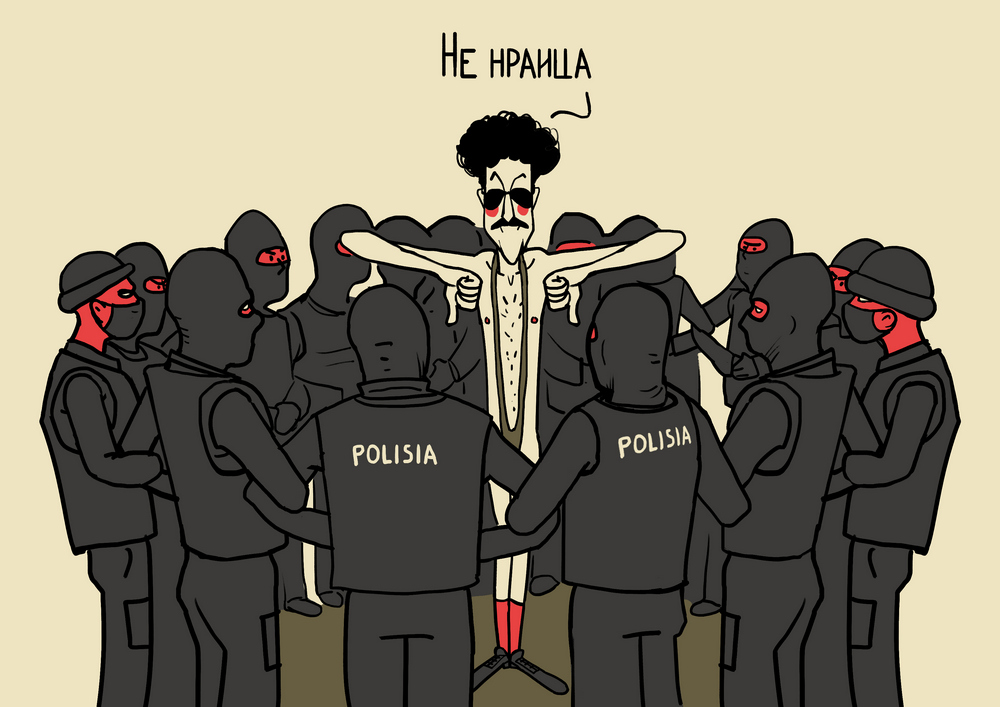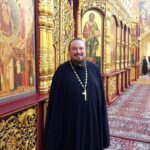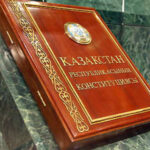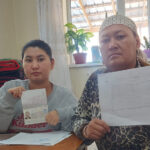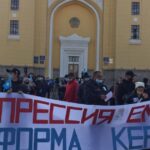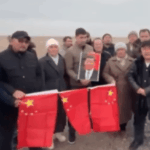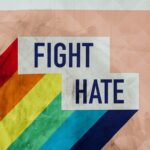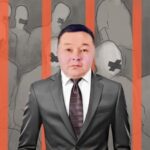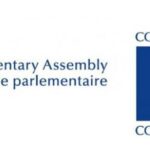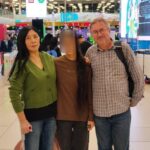SUMMARY
Since June 2020, Kazakhstan’s police have practiced kettling which is the encirclement of peaceful protesters without allowing them to leave the circle, go to the toilet or have food and water passed to them. People were held for a maximum of 10.5 hours, with some of the protesters fainting and getting frostbites. In some cases, the police detain those who have been kettled. However, the police rarely draw up detention reports for an alleged violation of law and order by those kettled, nor do they subsequently prosecute them administratively or criminally. So, judging by the reaction of the police, these individuals are often not regarded as offenders from the point of view of Kazakhstani law.
Also during kettling, peaceful protesters are surrounded by people who are controlled by the police and city officials and who insult those inside the circle, attempt to provoke fights, bring sound-amplifying equipment and turn on the music at full volume, psychologically attacking the protesters for hours.
The police refuse to investigate claims filed those unlawfully detained, and the Prosecutor’s Office and the Ombudsman do not see this as a violation of the rights of Kazakhstani citizens.
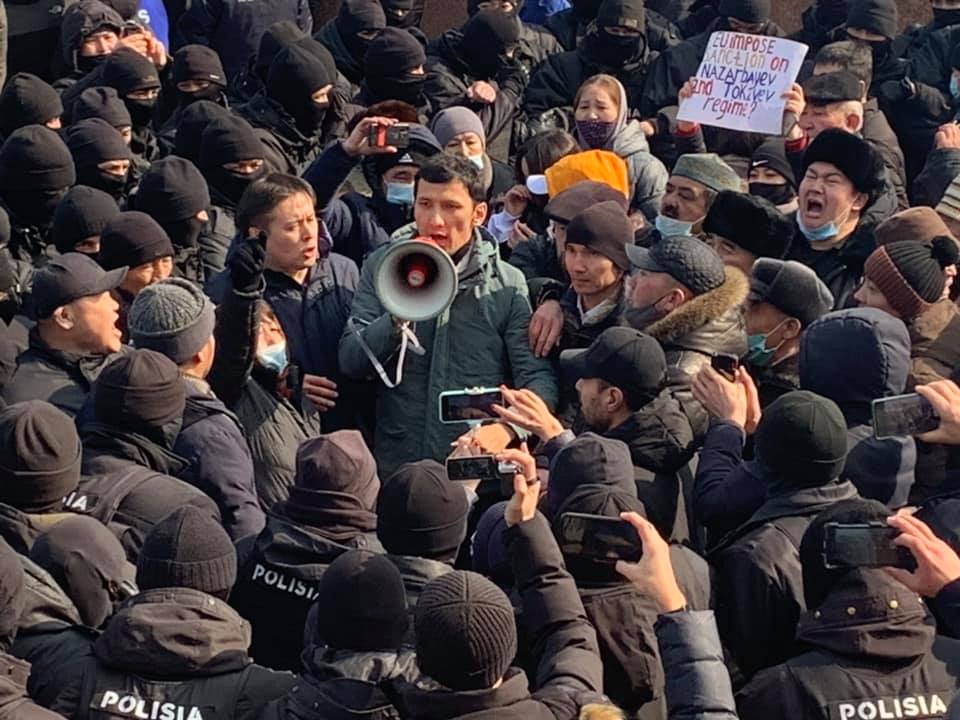
Cases of kettling
- On June 6, 2020, the birthday of the first president Nursultan Nazarbayev, several opposition groups in Almaty and Nur-Sultan intended to call on the authorities to implement a credit amnesty, release political prisoners, and ban the sale of land to foreigners. In Almaty, the police detained up to a hundred peaceful protesters that day. The police encicrled about three dozen supporters of the unregistered opposition Democratic Party, led by its leader Zhanbolat Mamay, near the Palace of the Republic and kept them kettled for about three hours. The protesters were then released on demand of the deputy head of the city administration Yerzhan Babakumarov[1].
- On December 16, 2020 (Independence Day), the police encircled two small groups of protesters near Republic Square in Almaty. In 2011, the police opened fire on an oil workers’ strike in the town of Zhanaozen and at the Shetpe station in western Kazakhstan. A total of 15 people were killed that day according to official reports, and dozens were injured or tortured in police stations. Kazakhstani authorities have refused to conduct an independent international investigation and blamed the opposition and trade unions for what had happened. Since then, hundreds of civic activists in Kazakhstan demanded an independent investigation by the authorities every year[2]. On December 16, 2020, in Almaty, activists from the unregistered opposition Democratic Party and the Oyan, Qazaqstan (Wake up, Kazakhstan) youth movement also intended to call on the authorities to conduct an objective investigation. They also demanded the release of political prisoners, social and political reforms, and prohibition to sell land to foreigners. Approximately 30 protesters from the Democratic Party were kettled by police in Republic Square. In addition, 20 protesters from the Oyan, Qazakhstan movement were encircled 200 meters from Republic Square. Both groups were kept encircled in the frost for three hours. Some unknown persons, allegedly controlled by city authorities and the police, insulted those in the encirclement and attempted to provoke fights.[3]
- On January 10, 2021, parliamentary and local council elections were held in Kazakhstan, where the ruling party of former President Nazarbayev, Nur Otan, won by a huge margin, yet with numerous violations. Opposition groups representing the unregistered Democratic Party and the Oyan, Qazaqstan movement intended to voice their disagreement with the election results in Almaty. The police encircled both groups near Republic Square and held them for nine and seven hours, respectively. In both cases loudspeakers and musical equipment were brought in, and unknown people supervised by the police turned on loud music and forced the protesters to listen to it. Some people controlled by the police struck several of the kettled protesters and insulted them alleging their possible affiliation with the LGBT community. The people inside the circle were not allowed to go to the toilet or have food or hot drinks passed to them. Only those who fainted were allowed to be taken out and ambulances came to pick them up. During those hours, several people got frostbites[4]. The same day, the police kettled two groups of protesters from the unregistered Democratic Choice of Kazakhstan movement on Astana Square, also in Almaty. Those were held in a circle for about an hour, and then most of them were detained and taken to police stations.
- On February 28, 2021, the unregistered opposition Democratic Party announced the holding of a procession from the Palace of Sports to Republic Square in Almaty demanding compliance with the European Parliament resolution, ban on the rent of land to foreigners, credit amnesty, and political reforms in Kazakhstan. As before, the police kettled the Democratic Party activists near the Palace of Sports and kept them encircled for 10.5 hours. Three people were injured by the police when they tried to get out. Again, the police used provocateurs to insult the encircled people and expose them to loud music. The same day, the police in Nur-Sultan also kettled protesters from the Democratic Choice of Kazakhstan opposition group and held them for several hours in the cold near the Artem market. Three women were allowed out of the circle to go to the toilet, but they were immediately detained and taken to the police station[5]. In Aktau, Max Bokayev, a well-known civic activist, and his supporters (about ten people in total) went to a square with similar demands, where they were immediately encircled by the police. Bokayev asked his supporters to go home, and the police let the people out.[6]
- On April 5, 2021, the police kettled workers at a goldsmith’s shop in the village of Altyntobe (near Shymkent). The workers were on a spontaneous rally after the arrest of the workshop’s director. Immediately afterward, special police units were brought into the village. About 50 people were encircled and one hour later they were all detained and taken to police stations.[7]
- On May 25, 2021 in Nur-Sultan, Baglan Orynbekov, who had arrived in the capital with a request for a housing solution, attempted to march with his family to the presidential administration building, but the police stopped him with his wife and ten children by using kettling. Special police officers encircled the large family, blocking traffic on the approaches to Akorda. After a while, the family was released from the police ring.[8]
Violations of Kazakhstani law and international covenants
In all the cases, people were kettled by special police units. As a rule, the number of police officers is three to four times higher than that of protesters. It is impossible to identify the policemen, as their faces are hidden behind masks. Police officers do not explain to the encircled people their rights or the reason for the encirclement.
The laws of Kazakhstan lack any norms or regulations on the use of kettling, which means that the police cannot refer to the local legislation.
According to the Regulatory Resolution of the Constitutional Council of the Republic of Kazakhstan dated April 13, 2012, detention means “a coercive short-term measure […] to restrict personal liberty of a person by authorized state bodies, officials and other persons on the grounds and in the manner prescribed by law,” while actual detention means “a restriction of liberty, including freedom of movement, or forced detention in a certain place […], as well as any other action substantially restricting personal liberty, regardless of the procedural status or other formal procedures applied to the detainee, measured from the exact minute when the detainee’s liberty, including freedom of movement, was restricted.” However, these definitions do not apply to those kettled.
Moreover, Article 19.3 (Powers of the Bodies of Internal Affairs) of the Law On the Bodies of Internal Affairs of the Republic of Kazakhstan reads that “Actions by internal affairs officers, which temporarily restrict the rights of individuals, shall be accompanied by the words ‘In the name of the law.’ Each person in such a case shall stop active actions, unconditionally obey the demands of the internal affairs officer, and comply with their instructions pertaining to the performance of their official duties.” However, when using kettling as well as during subsequent or preliminary detentions, police officers never used the words ‘In the name of the law’. This suggests that the actions of those whose rights were restricted by the police did not violate the law, or that the police themselves violated the law and their actions were unlawful.
Article 39.1 reads that “The rights and liberties of an individual and a citizen may be restricted only by law and only to the extent necessary to protect the constitutional order, public order, human rights and freedoms, health and morals of the population.” That said, kettling has no definition in the laws of Kazakhstan.
In addition, the actions of police officers violate Article 32 of the Constitution of the Republic of Kazakhstan, reading that “Citizens of the Republic of Kazakhstan have the right to gather peacefully and without weapons, hold meetings, rallies and demonstrations, marches and pickets. The exercise of this right may be restricted by law in the interests of national security, public order, public health, or protection of the rights and freedoms of others,” as the citizens in these cases did not violate the law and public order.
Police actions also violate the International Covenant on Civil and Political Rights (ICCPR), ratified by Kazakhstan on February 11, 2009 and directly applicable in Kazakhstan.
Article 9.1: “Everyone has the right to liberty and security of person. No one shall be subjected to arbitrary arrest or detention. No one shall be deprived of his liberty except on such grounds and in accordance with such procedure as are established by law.”
Articles 12.1 and 12.3: “1. Everyone lawfully within the territory of a State shall, within that territory, have the right to liberty of movement and freedom to choose his residence”; “3. The above-mentioned rights shall not be subject to any restrictions except those which are provided by law, are necessary to protect national security, public order (ordre public), public health or morals or the rights and freedoms of others, and are consistent with the other rights recognized in the present Covenant.”
Article 21: “The right of peaceful assembly shall be recognized. No restrictions may be placed on the exercise of this right other than those imposed in conformity with the law and which are necessary in a democratic society in the interests of national security or public safety, public order (ordre public), the protection of public health or morals or the protection of the rights and freedoms of others.”
* * *
In addition, the cases of the use of kettling in Kazakhstan contradict the principles of international organizations, whose full member is the Republic of Kazakhstan. These are:
– Guidelines on Freedom of Peaceful Assembly (developed by OSCE/ODIHR and the Venice Commission of the Council of Europe); and
– General Comment No. 37 of the UN Human Rights Committee on Article 21 of the ICCPR.
* * *
The Criminal Code of the Republic of Kazakhstan includes two articles that can be applied to police officers for the unlawful use of kettling.
Article 146. Torture. “An intentional infliction of physical suffering and (or) emotional distress committed by an investigator, a person conducting an inquiry, or another official or person with their instigation or with their knowledge or acquiescence, to obtain from the tortured or another person information or confession or to punish them for an act which they or another person has committed or is suspected of having committed, or to intimidate or coerce them or a third person or for any reason based on discrimination of any nature.”
Article 362. Abuse of power or official authority. “An abuse of power or official authority, i.e. the commission by a person authorized to perform official functions or by a person equivalent to them or to an official of acts clearly beyond their rights and powers that damage substantially the rights and legitimate interests of citizens or organizations or legally protected interests of society or the state.”
Official reaction to the cases of kettling in Kazakhstan
Kanat Taimerdenov, Head of Almaty Police Department, answered journalists’ questions at a briefing held on December 28, 2020, why Oyan, Qazaqstan and Democratic Party activists who gathered on December 16 in Republic Square, were blocked by the police. “We told them, but they wouldn’t [listen]. There were representatives of the mayor’s office, the prosecutor’s office, who explained the norms of the law, but they did not obey,” he said[9].
“An internal investigation has found no criminal offenses in the actions of police officers. In this regard, on February 10, 2021, A. Rakhimbay, investigator at the Almaty Anti-Corruption Service Department, filed this material to the nomenclature archives,” reads the response from the Prosecutor’s Office to the claimant Aizat Abilseit, an affected activist of the youth movement Oyan, Qazaqstan[10].
Finally, on March 1, 2021, Elvira Azimova, Human Rights Commissioner (Ombudsman) of the Republic of Kazakhstan, told in a telephone conversation with Radio Azattyk (the Kazakh RFE/RL service) that, “There are OSCE recommendations in this regard. This is a measure related exclusively to security. The use of this measure should be approved as a norm based on an open dialogue with civic activists.”[11]
Attempts to appeal the actions of the police
Oyan, Qazaqstan activists filed two court complaints against the actions of the Prosecutor’s Office and the Anti-Corruption Service, which had ignored the use of kettling by the police.
The complaint filed by Aizat Abilseit against the Prosecutor’s Office and the Anti-Corruption Service, which had found no offense in the hours-long kettling of activists on January 10, 2021, the day of the parliamentary elections, was dismissed by the court. The ruling was made on March 12 by Maral Zharylgasova, judge of the Almaty Specialized Inter-district Investigative Court.
The Anti-Corruption Service, to which Ms Abilseit appealed, referred the materials to the Internal Security Division of the Almaty Police Department for an official investigation, and the department found no grounds to prosecute its employees. On February 15, Ms Abilseit received a response from the Prosecutor’s Office, which had found that the kettling had not been a “criminally punishable act.”[12]
On March 15, 2021, the Almaty Specialized Inter-district Investigative Court dismissed a complaint filed by Darkhan Sharipov, another member of the Oyan, Qazaqstan opposition movement, against the Anti-Corruption Service and the Almaty Prosecutor’s Office.[13]
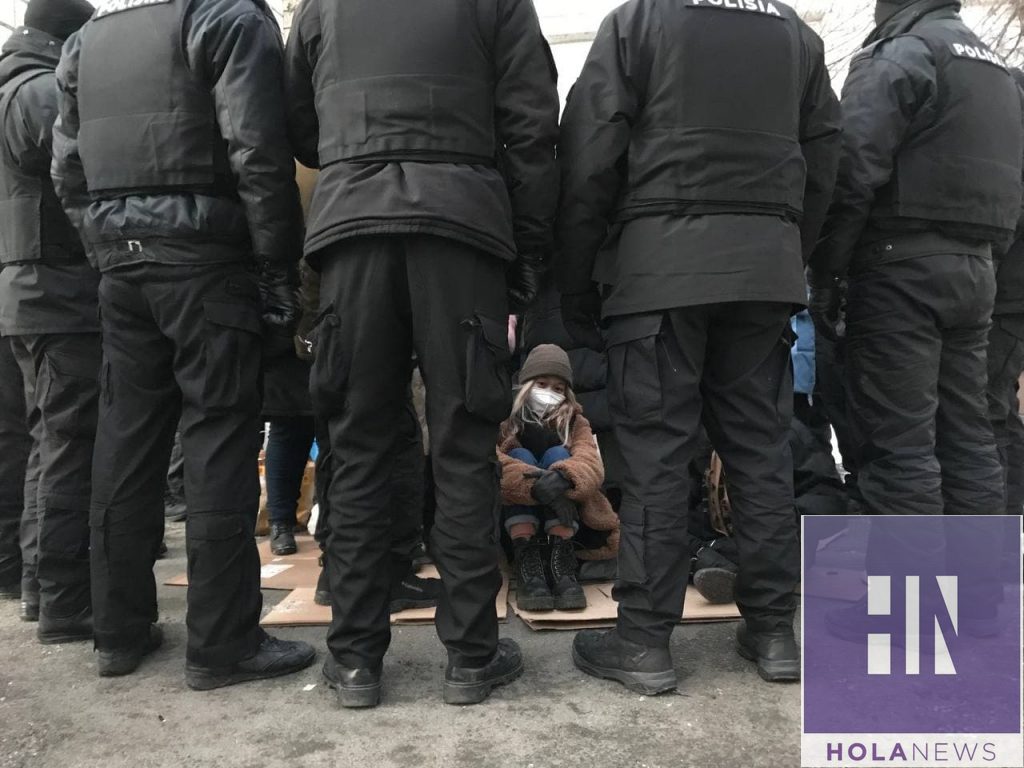
Co-signed by:
Kazakhstan International Bureau for Human Rights and Rule of Law
Democratic Party
Oyan, Qazakhstan movement
[1] See: “«Шал, кет!» Свыше сотни задержанных, оцепленные «для дезинфекции» площади”, Радио «Азаттык», https://rus.azattyq.org/a/kazakhstan-rallies-6-june/30656050.html.
[2] See “They shot to kill: the massacre of Kazakhstan’s striking oil workers, eight years on”, OpenDemocracy.net, https://www.opendemocracy.net/en/odr/they-shot-to-kill-the-massacre-of-kazakhstans-striking-oil-workers-eight-years-on/)
[3] See “Активисты в кольце СОБРа. Как препятствовали протестам в Алматы”, https://rus.azattyq.org/a/kazakhstan-almaty-opposition-groups-rally/31003464.html)
[4] See “День зимнего стояния”, HolaNews.kz, https://holanews.kz/news/88487/)
[5] See “День взаимного неуважения”, Бюро по правам чеовека, https://bureau.kz/goryachee/den-vzaimnogo-neuvazheniya/, “Полиция Казахстана вновь применила кеттлинг к митингующим”, Радио «Азаттык» https://rus.azattyq.org/a/31125701.html).
[6] См. “Бокаев распустил сторонников, чтобы не допустить кеттлинга”, радио «Азаттык», https://rus.azattyq.org/a/31126216.html)
[7] См. “Полиция применила кеттлинг и забрала около 50 сельчан со стихийного митинга близ Шымкента”, Радио «Азаттык», https://kaztag.kz/ru/news/politsiya-primenila-kettling-i-zabrala-okolo-50-selchan-so-stikhinogo-mitinga-bliz-shymkenta).
[8] См. “Полиция подвергла кеттлингу многодетную семью, направлявшуюся к Акорде”, радио «Азатык», https://rus.azattyq.org/a/31272567.html?withmediaplayer=1
[9] See “Кеттлинг митингующих 16 декабря в полиции Алматы объяснили «неподчинением»”, Радио «Азаттык», https://rus.azattyq.org/a/31023271.html).
[10] See “Прокуратура Алматы не усматривает в многочасовом кеттлинге в день выборов «уголовно наказуемых деяний”, Радио «Азаттык», https://rus.azattyq.org/a/31105903.html.
[11] See “Омбудсмен назвала кеттлинг мерой по обеспечению безопасности”, радио «Азаттык», https://rus.azattyq.org/a/31127170.html).
[12] См. “Поданную после кеттлинга жалобу активистки «Oyan, Qazaqstan» оставили без удовлетворения”, Радио «Азаттык», https://rus.azattyq.org/a/31147561.html.
[13] См. “Жалобу еще одного активиста «Oyan, Qazaqstan» на кеттлинг оставили без удовлетворения”, Радио «Азаттык», https://rus.azattyq.org/a/31152253.html)

